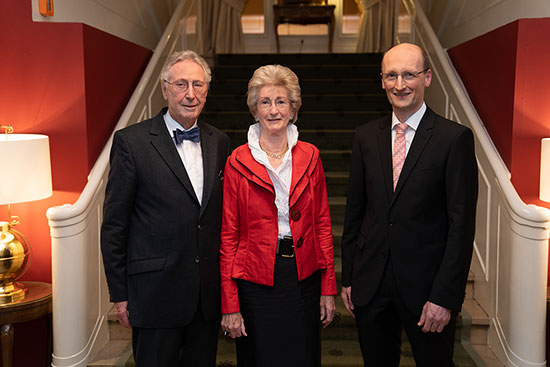Nano magnets for Quantum Computers
Prof. Dr. Wolfgang Wernsdorfer is awarded the Hector Science Award
HEIDELBERG/WEINHEIM. Prof. Dr. Wolfgang Wernsdorfer receives this year’s Hector Foundation Science award that includes prize money of 150.000 euro. The jury thus acknowledges the outstanding accomplishments of the 53-year-old physicist in the development of quantum computers. With his fundamental research about nanomagnets and electrical circuits, he is considered a pioneer of this futuristic technology that might one day surpass the computing power of today’s computers. Science and industry put much faith into quantum computers in fields as artificial intelligence, complex simulation modelling and data encryption, but also in medicine.
Whereas regular computers operate in bits that can assume the values one or zero, quantum computers smallest computing unit are the so-called qubits, which can also take on values between one and zero. The qubits can conduct many calculation steps simultaneously and are thereby many times faster than currently used computers. Wolfgang Wernsdorfer discovered magnetic properties of specific molecules (smallest unit of a chemical compound that consists of different atoms) that are suitable for quantum computers. As early as the 90s in his doctoral thesis, he developed a device to measure the magnetic attributes of nanomagnets much faster than any commercially available magnetometer. Later, he succeeded in creating the very first molecular computing circuits used for stabilizing the system as the qubits are very sensitive. They have to be cooled down to temperatures close by the absolute zero (-273,15 °C). Even a single atom out of line can disrupt the qubits.
Wolfgang Wernsdorfer’s background is also quite remarkable, as he grew up with six siblings. His father was a goldsmith – he was destined for a career in artisanship. When he was 15 years old, he finished his secondary education and did an apprenticeship as an electrician. Later, however, he took his A‑levels and studied physics in Würzburg. After six semesters, he received a scholarship in France. He obtained his doctorate and habilitation in Grenoble, where he became research director in 2004. Since 2016, the 53-year-old father of four children has been holding a Humboldt Professorship at the Karlsruhe Institute of Technology (KIT). He received many awards for his ground-breaking research such as the Gottfried Wilhelm Leibniz Prize in 2019, the most important research promotion prize in Germany.
During the festive award ceremony of the Hector Science Award at Hotel Europäischer Hof in Heidelberg, Prof. Dr. Andreas Meyer-Lindenberg, director of the Central Institute for Mental Health in Mannheim, praised the laureate and his stellar research. He illustrated the scope of Prof. Dr. Wernsdorfer’s work with a quote by Friedrich Dürrenmatt: “The substance of physics concerns the physicists; the effect concerns all of humanity.”
The chairperson of the Hector Foundation Uwe Bleich welcomed Wolfgang Wernsdorfer as the 25th scientist to the circle of Hector Fellows. The goal of the charity – realised through the foundation of the Hector Fellow Academy in 2013 — is to promote interdisciplinary exchange as well as research cooperation between the Hector Fellows. Furthermore, the Hector Fellow Academy offers early career researchers the opportunity to work on either an advertised project or their own research idea under the supervision of a Hector Fellow.
This evening, the Hector Fellows also arranged a special surprise for the founder Dr. h.c. Hans-Werner Hector: as a belated present for his 80th birthday on January 17, they jointly created a commemorative publication honouring the founder. On behalf of all Hector Fellows, Prof. Dr. Martin Wegener bestowed the unique copy of the publication to Hans-Werner Hector and expressed his deepest gratitude for the beneficial work of the foundation that supports not only science and education, but also social institutions, art and culture.
Press release of the Hector Foundation II

From left: Dr. h.c. Hans-Werner Hector, Josephine Hector, Prof. Dr. Wolfgang Wernsdorfer.
